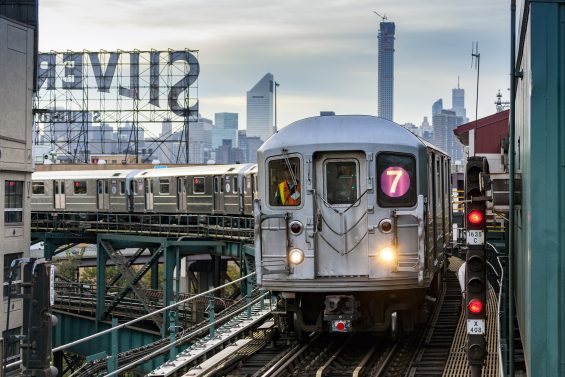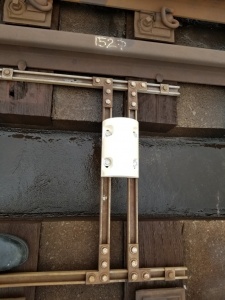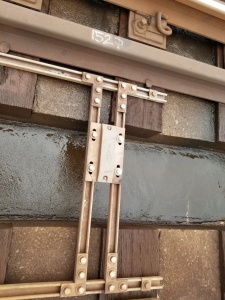 Dec. 12, 2019 By Allie Griffin
Dec. 12, 2019 By Allie Griffin
The 7 train line’s expensive new signaling system was slowed down by a little slush this Wednesday morning, causing the subway line to operate at reduced speeds and New York City Transit President Andy Byford to have some strong words for the outside vendor responsible.
NYCT Subways tweeted that 7 trains were running at slower speeds between 111st Street and Queensboro Plaza in both directions because of inclement weather at about 5:30 a.m. By about 11:30 a.m., service resumed its normal speeds, the agency said.
A year ago to the month, the entire 7 line’s signals were replaced with a new system known as Communications-Based Train Control (CBTC), which helps dispatchers know where trains are along the tracks more precisely than the old system.
The $588 million CBTC project, which took nearly a decade to complete, allows trains to travel closer together and at faster speeds. The 7 line and L line both have the new technology.
Yet the expansive state-of-the-art signal technology failed to compete with flurries during the Wednesday morning commute.
Byford said the failure wasn’t due to the CBTC technology, but because of the CBTC vendor’s “wholly inexcusable” failure to cover every transponder along the elevated 7 line.

A covered transponder along the 7 train rails (MTA)

An uncovered transponder along the 7 train rails (MTA)
In a strongly-worded letter to a vice president at Thales, the vendor that installed the CBTC system along the 7 line, Byford said the failure of Thales transponders and its inability to deal with slush has been known to the company since March.
“This is, of course, not a CTBC issue per se, but rather it is a failure on the part of Thales to provide reliable track-side infrastructure,” Byford said in the letter to Thales Executive Vice President of Ground Transportation Systems Millar Crawford.
“I am sure you are embarrassed by the fact that your competitor’s equipment has worked flawlessly on the L line under identical weather conditions,” Byford continued. “Therefore, we know conclusively that this is not a CBTC issue, but rather a Thales issue, and I hold Thales accountable for getting this safely fixed as a matter of utmost urgency.”
Byford said “severe commercial consequences” would result if Thales doesn’t immediately resolve the issue.
Thales was quick to respond with a statement.
“Thales is deeply sorry for the impact this problem has had on New Yorkers and their reliable use of the 7 Line under adverse weather conditions,” a spokesperson for Thales said. “All our teams are fully resourced, mobilized and committed to deliver and deploy the solution as quickly as possible in order to offer New York commuters the best level of service and avoid speed reductions in such weather conditions.”
One Comment







Riders have had to endure too many years of inconvenience as a result of the MTA NYC Transit investing over $600 million in Communication Based Train Control on the Flushing #7 line. With or without CBTC, there have always been opportunities to increase capacity and service by running trains more frequently mid-day, evenings, overnight and weekends on the #7 line. Until the 1980’s, there was Manhattan bound express service till 12:30 PM. Flushing bound express service began after 1 PM. There has been no express service between 10 AM and 3 PM due to periodic ongoing track, power, signal, and routine maintenance projects for decades, including work to support CBTC. How many more years will riders have to wait for mid day express service to resume?
With implementation of CBTC last December 2018 (which was supposed to have been completed in October 2016) , why are there still technical problems one year later? The anticipated final potential cost can never be known until reaching beneficial use, acceptance of maintenance manuals for the physical assets, inspection and acceptance to insure all contract specifications have been achieved, completion of all contract punch list items followed by release of retainage and final payment to the vendor(s). What is the status for completion for all of the above? You have to wonder given periodic ongoing issues with CBTC, if NYC Transit prematurely accepted the vendors product one year ago. In any case, implementation of CBTC on the Flushing #7 lline has only resulted in increasing the number of rush hour trains by 2 from 27 to 29 in each direction. After that investment, NYC Transit no longer has any other opportunity for increasing #7 line rush hour capacity.
There are opportunities to increase capacity and service by running trains more frequently mid-day, evenings, overnight and weekends. There is always equipment used primarily for rush hour peak service that is available to provide additional service during off peak hours. It is a question of finding millions of dollars more to cover operating costs for additional service.
(Larry Penner — a transportation historian, advocate and writer who previously worked 31 years for the Federal Transit Administration Region 2 NY Office. This included the development, review, approval and oversight for grants supporting billions in capital projects and programs on behalf of the MTA, NYC Transit, MTA Bus, Long Island Rail Road, Metro North Rail Road and NYC Department of Transportation along with 30 other NY & NJ transit agencies)